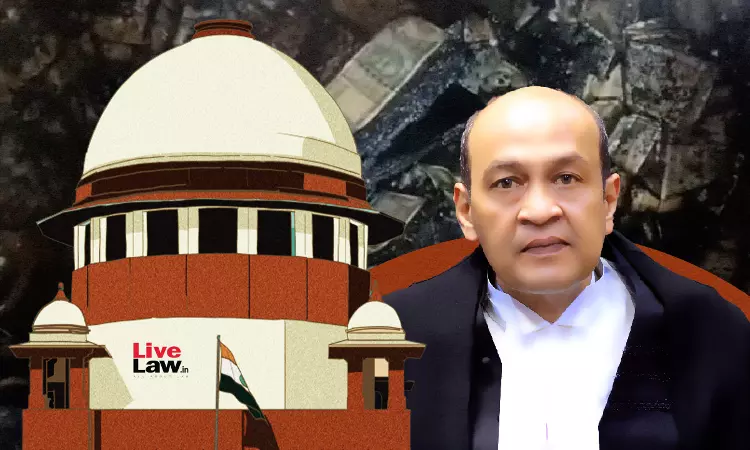- Home
- /
- Top Stories
- /
- 'Mere Cash Discovery Doesn't...
'Mere Cash Discovery Doesn't Establish Guilt': Justice Yashwant Varma In Supreme Court Petition
LIVELAW NEWS NETWORK
18 July 2025 4:31 PM IST
In his writ petition before the Supreme Court, Justice Yashwant Varma has contended that the mere recovery of cash from the outhouse of his official residence does not establish his culpability, as the in-house inquiry committee has not determined the ownership of the cash or how it was removed from the premises.He questioned the in-house committee's findings by contending that they were...
In his writ petition before the Supreme Court, Justice Yashwant Varma has contended that the mere recovery of cash from the outhouse of his official residence does not establish his culpability, as the in-house inquiry committee has not determined the ownership of the cash or how it was removed from the premises.
He questioned the in-house committee's findings by contending that they were entered not on the basis of any concrete evidence but on the basis of certain inferences and speculations, which, according to him, are not untenable. As per Justice Varma, the committee adopted a hasty procedure to achieve a predetermined result, without affording him adequate opportunity.
Claiming that he did not dispute the discovery of cash notes at the outhouse, Justice Varma said that its mere discovery is not sufficient to link him to any wrongdoing, without any clear evidence regarding its ownership and control.
According to him, the in-house panel had to answer the following questions:
a. When, how and by whom was the cash placed in the outhouse?
b. How much cash was placed in the outhouse?
c. Was the cash/currency genuine or not?
d. What was the cause of the fire?
e. Whether the Petitioner was in any manner responsible for the “removal” of “remnants of currency” on 15.03.2025?
Since the report did not give answers to these questions, it cannot lead to any inference of guilt against him.
"The mere discovery of cash provides no conclusive resolution. It remains essential to determine whose cash and how much was discovered. These aspects bear directly on the severity of the allegations, and equally, on the potential for orchestrated scandal; added to by the cause of the fire, whether intentional or accidental, and the involvement of the Petitioner in the alleged “removal” of the currency. The Final Report dated 03.05.2025 provides no answers to these pivotal questions," he contended.
Challenging the procedure adopted by the in-house panel, Justice Varma contended :
"The Committee failed to notify the Petitioner of its devised procedure, denied him any opportunity to provide inputs on the evidence to be collected, examined witnesses in his absence and provided him with paraphrased statements instead of video recordings (despite availability), selectively disclosed only “incriminating” material, ignored and failed to collect relevant and exculpatory evidence like CCTV footage (despite Petitioner's requests), denied opportunities of personal hearing, did not put any specific/tentative case to the Petitioner, impermissibly reversed the burden of proof without notice to the Petitioner, and effectively hindered any effective defence by the Petitioner."
Justice Varma also questioned the very in-house procedure, arguing that it has no statutory backing and that it violated the doctrine of powers, as the removal of judges is a matter within the domain of the Parliament. Since the Constitution does not confer any disciplinary authority on the Chief Justice of India over High Court Judges, he cannot order an in-house inquiry.
Justice Varma also took objection to the Supreme Court's public disclosure of the case documents and photos/videos, even before the commencement of the inquiry, saying that it resulted in irreparable loss of his reputation.
"Compounding these issues, media leaks of the Final Report's contents, followed by distorted reportage of the Committee's, were left unaddressed, perpetuating procedural unfairness, breaching the confidentiality inherent to the In-House Procedure, and continuing to inflict irreversible damange on the Petitioner's reputation and dignity," he submitted.
The issue relates to the accidental discovery of a huge pile of currency notes at an outhouse of the official residence of Justice Varma, then a judge of the Delhi High Court, during a fire-fighting operation on March 14. After the discovery led to a huge public controversy, the then CJI Sanjiv Khanna constituted an in-house inquiry committee of three judges- Justice Sheel Nagu (then Chief Justice of Punjab & Haryana High Court), Justice GS Sandhawalia (then Chief Justice of Himachal Pradesh High Court), and Justice Anu Sivaraman (Judge, Karnataka High Court). Justice Varma was repatriated to the Allahabad High Court and judicial work was withdrawn from him pending the inquiry.
The committee submitted its report to CJI Khanna in May, which the CJI forwarded to the President and the Prime Minister for further action, after Justice Varma refused to heed the CJI's advice to resign.
The 3-judge in-house inquiry committee termed Justice Varma's conduct after the fire incident on March 14 - which led to the discovery of the currency notes - unnatural, leading to certain adverse inferences against him.
After examining 55 witnesses, including Justice Varma and his daughter, and electronic evidence in the form of videos and photographs taken by the members of the fire brigade, the committee held that cash was found in his official premises. Finding that the storeroom was within the “covert or active control of Justice Varma and his family members”, the committee held that the burden was upon him to explain the presence of cash. Since the judge could not discharge his burden by offering a plausible explanation, except giving a "flat denial or a bald plea of conspiracy", the committee found sufficient grounds to propose action against him.
Case : XXX v. Union of India | Diary No.38664/2025



